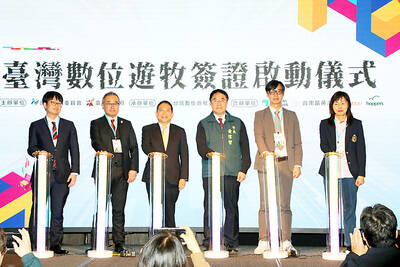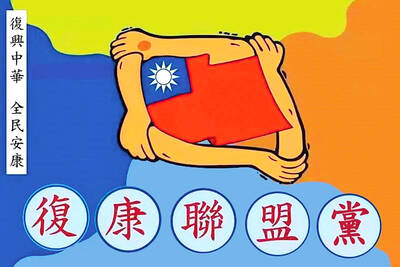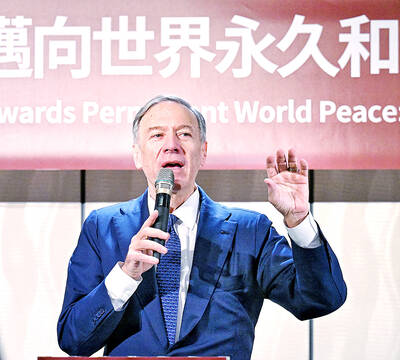The Presidential Office and the Democratic Progressive Party (DPP) yesterday agreed that President Ma Ying-jeou (馬英九) and DPP Chairman Su Tseng-chang (蘇貞昌) will hold a live TV debate on the cross-strait service trade agreement on Sept. 15.
The two-hour debate, to be hosted by the Taiwan Public Television Service Foundation, will start at 2pm. Ma and Su will each ask and respond to four questions and issue four additional rebuttals; there will be no question-and-answer session with the media, Presidential Office Deputy Secretary-General Lo Chih-chiang (羅智強) and the DPP’s Tsai Chi-chang (蔡其昌) said yesterday in announcing the debate format at the TV station after a closed-door meeting.
Lo said that negotiations on the debate date and format between the Presidential Office and the DPP went smoothly, and the two sides agreed to most of the organizer’s proposal.
Asked whether Ma was confident about performing well in the debate, Lo said the key to the debate is to discuss the potential positive and negative impacts of the pact on the nation.
“People will have a better understanding of the agreement through the debate, and they should be the judge [of the president’s performance] in the debate,” Lo said.
The debate format is similar to the previous debate on the Economic Cooperation Framework Agreement (ECFA) in 2010 between Ma and then-DPP chairperson Tsai Ing-wen (蔡英文), which had included a media Q&A session.
The Presidential Office and the KMT have accused Su of turning down a Q&A with the media during the live debate, saying the DPP chairman was trying to shun media scrutiny.
As the government is striving to win public support for the pact, Ma readily agreed to the proposed debate when the idea was raised last week.
He said it should help the public understand the agreement, and a Q&A with reporters would give the government more opportunities to explain the pact.
Tsai Chi-chang, the main negotiator of a four-member DPP team, said: “We were glad the negotiation went smoothly, and we have full confidence that Chairman Su, as the leader of the main opposition party, will be able to speak for the Taiwanese people.”
The other DPP representatives were the party’s Policy Research Committee deputy executive director Huang Chih-ta (黃致達), Department of Communication deputy director Chang Li-ke (張力可) and spokesperson Wang Min-shen (王閔生).
However, the Presidential Office disagreed with the DPP’s proposal to make the debate “the 17th public hearing” following the 16 public hearings that are scheduled to be held by the legislature on various service sub-sectors that would be affected by the trade agreement, Tsai Chi-chang said.
The media Q&A, which the DPP had vetoed, was not mentioned during the negotiation, he added.
Discussion about a potential debate on the agreement resurfaced following the latest survey released by the Chinese-language China Times earlier last week, which showed that 63 percent of respondents agreed that Ma and Su should hold a debate over the agreement.
The service trade agreement was inked on June 21 in Shanghai by the Straits Exchange Foundation and the Association for Relations Across the Taiwan Straits as part of the ECFA.
Additional reporting by Chris Wang

QUIET START: Nearly a week after applications opened, agencies did not announce or promote the program, nor did they explain how it differed from other visitor visas Taiwan has launched a six-month “digital nomad visitor visa” program for foreign nationals from its list of visa-exempt countries who meet financial eligibility criteria and provide proof of work contracts. To apply, foreign nationals must either provide proof that they have obtained a digital nomad visa issued by another country or demonstrate earnings based on age brackets, the Bureau of Consular Affairs said. Applicants aged 20 to 29 must show they earned an annual salary of at least US$20,000 or its equivalent in one of the past two years, while those aged 30 or older must provide proof they earned US$40,000 in

AIR DEFENSE: The Norwegian missile system has proved highly effective in Ukraine in its war against Russia, and the US has recommended it for Taiwan, an expert said The Norwegian Advanced Surface-to-Air Missile Systems (NASAMS) Taiwan ordered from the US would be installed in strategically important positions in Taipei and New Taipei City to guard the region, the Ministry of National Defense said in statement yesterday. The air defense system would be deployed in Taipei’s Songshan District (松山) and New Taipei City’s Tamsui District (淡水), the ministry said, adding that the systems could be delivered as soon as the end of this year. The US Defense Security Cooperation Agency has previously said that three NASAMS would be sold to Taiwan. The weapons are part of the 17th US arms sale to

SERIOUS ALLEGATIONS: The suspects formed spy networks and paramilitary groups to kill government officials during a possible Chinese invasion, prosecutors said Prosecutors have indicted seven retired military officers, members of the Rehabilitation Alliance Party, for allegedly obtaining funds from China, and forming paramilitary groups and assassination squads in Taiwan to collaborate with Chinese troops in a possible war. The suspects contravened the National Security Act (國家安全法) by taking photos and drawing maps of key radar stations, missile installations and the American Institute in Taiwan’s headquarters in Taipei, prosecutors said. They allegedly prepared to collaborate with China during a possible invasion of Taiwan, prosecutors said. Retired military officer Chu Hung-i (屈宏義), 62, a Republic of China Army Academy graduate, went to China

UNITY MESSAGE: Rather than focusing on what Trump said on the campaign trail about Taiwan, Taipei should be willing to engage with the US, Pompeo said Taiwan plays a key role in Washington’s model of deterrence against China, former US secretary of state Mike Pompeo said in a speech in Taipei yesterday. During US president-elect Donald Trump’s first term, “we had developed what we believe was a pretty effective model of deterrence against adversaries who wanted to undermine the set of rules and values that the people of Taiwan and the people of the US hold dear,” Pompeo said at a forum organized by the Formosa Republican Association. “Succeeding in continuing to build this model will not solely rest at the feet of president Trump and his team,